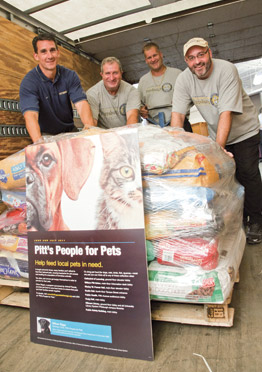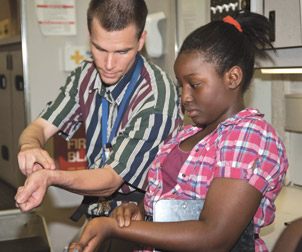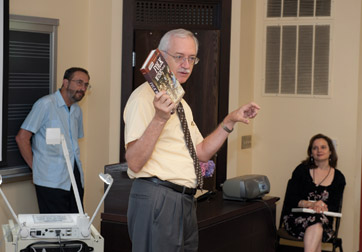Home ›
Newsmakers
Issue Date:
August 23, 2011  PITT'S PEOPLE FOR PETS: Pitt’s People for Pets campaign, held on the Pittsburgh campus during June and July, generated 4,000 pounds of donated pet food and nearly $2,000 in online cash donations—one of the largest and most successful such drives for Animal Friends’ Chow Wagon program. Animal Friends operates the program to provide donated pet food to the region’s food banks. “The Chow Wagon program keeps pets in the home and tells the pet owners that people care about them,” said Ann Cadman, health and wellness coordinator for Animal Friends. From left, Matt Sloan, Joe Healey, Dave Rahuba, and Dave Huey—all from Pitt’s Department of Parking, Transportation, and Services’ Central Receiving Office—load a pallet of donations for delivery to the Animal Friends shelter in Ohio Township. Officer Riggs, a Labrador Retriever and certified explosives detection specialist for the Pitt Police K-9 Unit, served as the Pitt campaign’s honorary chair and spokesdog. Sponsors of Pitt’s campaign were the Office of the Chancellor, the Office of Community Relations, the Department of Public Safety, and the University Library System.
PITT'S PEOPLE FOR PETS: Pitt’s People for Pets campaign, held on the Pittsburgh campus during June and July, generated 4,000 pounds of donated pet food and nearly $2,000 in online cash donations—one of the largest and most successful such drives for Animal Friends’ Chow Wagon program. Animal Friends operates the program to provide donated pet food to the region’s food banks. “The Chow Wagon program keeps pets in the home and tells the pet owners that people care about them,” said Ann Cadman, health and wellness coordinator for Animal Friends. From left, Matt Sloan, Joe Healey, Dave Rahuba, and Dave Huey—all from Pitt’s Department of Parking, Transportation, and Services’ Central Receiving Office—load a pallet of donations for delivery to the Animal Friends shelter in Ohio Township. Officer Riggs, a Labrador Retriever and certified explosives detection specialist for the Pitt Police K-9 Unit, served as the Pitt campaign’s honorary chair and spokesdog. Sponsors of Pitt’s campaign were the Office of the Chancellor, the Office of Community Relations, the Department of Public Safety, and the University Library System. MOBILE LAB FIELD TRIP: Youth from the Pitt School of Education’s five-week P.A.C.K. Camp (Physical Activity Camp for Kids) participated in hands-on activities about fitness during a July 6 visit to The Mobile Lab—a self-contained, traveling laboratory that allows students to use current, high-end equipment to perform laboratory investigations. Here, Nathan Rockcastle explains to Zoe Vongtau how to locate her radial pulse so she could obtain a resting (before exercise) reading and an active (after exercise) reading. Rockcastle is an administrative supervisor in the lab of Judy Cameron, a Pitt professor of psychiatry and a senior scientist in the Oregon National Primate Research Center at Oregon Health and Science University. The Mobile Lab is a project of the Pitt Department of Biological Sciences, the University of Pittsburgh Clinical and Translational Sciences Institute, The Pittsburgh Life Sciences Greenhouse, The Lyceum Group, Thermo Fisher, and the Pittsburgh Tissue Engineering Initiative.
MOBILE LAB FIELD TRIP: Youth from the Pitt School of Education’s five-week P.A.C.K. Camp (Physical Activity Camp for Kids) participated in hands-on activities about fitness during a July 6 visit to The Mobile Lab—a self-contained, traveling laboratory that allows students to use current, high-end equipment to perform laboratory investigations. Here, Nathan Rockcastle explains to Zoe Vongtau how to locate her radial pulse so she could obtain a resting (before exercise) reading and an active (after exercise) reading. Rockcastle is an administrative supervisor in the lab of Judy Cameron, a Pitt professor of psychiatry and a senior scientist in the Oregon National Primate Research Center at Oregon Health and Science University. The Mobile Lab is a project of the Pitt Department of Biological Sciences, the University of Pittsburgh Clinical and Translational Sciences Institute, The Pittsburgh Life Sciences Greenhouse, The Lyceum Group, Thermo Fisher, and the Pittsburgh Tissue Engineering Initiative. USING MUSIC AS A TEACHING TOOL: What’s the best way to teach an 11-year-old about important events in U. S. history without his eyes glazing over? Mix American music into the curriculum, according to Deane Root (center), codirector of Pitt’s Voices Across Time institute that was held on the Pittsburgh campus June 27-July 29. Root is a professor of music and director and Fletcher Hodges Jr. Curator of the Center for American Music at Pitt. Twenty-three teachers from across the country gathered with music historians and musicians to learn how to weave songs into classroom material. “Music is a medium kids relate to,” said Norm Cohen (left), a Portland, Oregon-based author and historian with expertise in railroad folk songs. “They don’t think of it as an educational tool.” Institute administrator Kathryn Miller Haines is seated on the right.
USING MUSIC AS A TEACHING TOOL: What’s the best way to teach an 11-year-old about important events in U. S. history without his eyes glazing over? Mix American music into the curriculum, according to Deane Root (center), codirector of Pitt’s Voices Across Time institute that was held on the Pittsburgh campus June 27-July 29. Root is a professor of music and director and Fletcher Hodges Jr. Curator of the Center for American Music at Pitt. Twenty-three teachers from across the country gathered with music historians and musicians to learn how to weave songs into classroom material. “Music is a medium kids relate to,” said Norm Cohen (left), a Portland, Oregon-based author and historian with expertise in railroad folk songs. “They don’t think of it as an educational tool.” Institute administrator Kathryn Miller Haines is seated on the right.Other Stories From This Issue
There are no stories for the issue at this time.
On the Freedom Road

Follow a group of Pitt students on the Returning to the Roots of Civil Rights bus tour, a nine-day, 2,300-mile journey crisscrossing five states.
Day 1: The Awakening
Day 2: Deep Impressions
Day 3: Music, Montgomery, and More
Day 4: Looking Back, Looking Forward
Day 5: Learning to Remember
Day 6: The Mountaintop
Day 7: Slavery and Beyond
Day 8: Lessons to Bring Home
Day 9: Final Lessons

